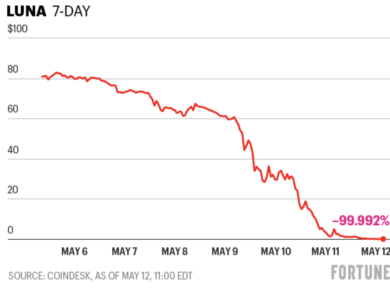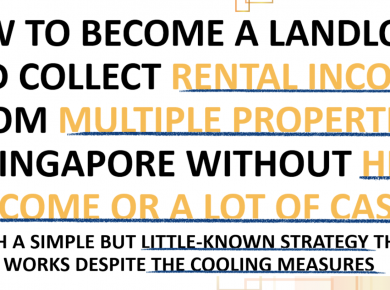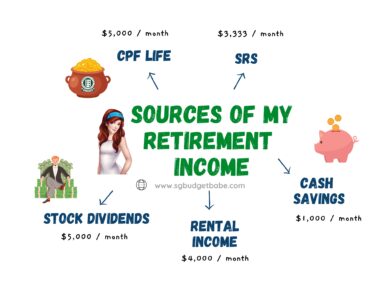Been getting a few emails from readers regarding how I pick my stocks so I thought I'd share that today!
Background : I'm more of a value + growth trader. I like to look for stocks that are undervalued and have room to grow. That way, I'll get gains from both dividends and when the stock price increases in the (near) future!
Do you buy investment-linked plans or any investment plans offered by your insurance agent / financial advisor?

No. I've explained this numerous times before, but new readers can check out my blog post on why and how you can learn to decide for yourself as well (the search bar on the blog is great for finding old articles).
What about investment recommendations from your banker?
Also another no. You must understand that there is a massive conflict of interest when FAs, insurance agents or bankers try to sell you a product – their livelihood depend on it, so wouldn't they be more inclined towards selling those that nett them higher commissions?
(while there may be good agents out there who don't operate the same way, I only know of a very very small handful.)
Do you invest based on analyst reports and their buy/sell recommendations?
No. Some may live their entire investing lives by the word of analysts, but I'm not one of them. Oh, the number of times analysts made a wrong buy/sell call on a counter…
In fact, there's evidence that analyst reports can move stocks prices. When my otherwise unheard-of counters suddenly get an analysts initiation report, prices usually shoot up. I either sell, or hold, when that happens. An investing methodology based on this is covered in the book below, but it isn't part of my strategy.

I also read many other books on investing, but what I found most useful has always been hands-on courses where I can ask questions and speed through the learning curve.
Some of my friends forked out $4000+ for a course that taught them 10 steps to investing, and when they told me, I was stunned because I could have easily taught them all the 10 over coffee 😨 in fact, I've already touched on some of these 10 in my blog before, including stuff like P/E ratio, current ratio, etc 😕 $4k??! 💸💸💸

Other than seeing how many agents mis-sell policies, there are also plenty who screw up their own investments or get into debt. Why should I take financial advice from them then?
I'm still refining my methodology (and I think I forever will be. Investing is a lifelong learning journey!) but what I've come up with so far has been good enough to give me 10% to 50% in capital returns.
Here are my top 4 criteria:
1. I identify and invest only in great companies
I like to look for companies who have superior business models and a strong competitive advantage (ideally with a wide moat). One example is Riverstone, which produces gloves for the healthcare industry, and whose stock I'm also vested in (and sitting on paper gains as we speak).
2. I look for a trustworthy and capable management team.
In any organisation, you need great leaders to survive and grow, otherwise how to succeed when your boss is a prick or a dishonest merchant, right?
I like a management team that is committed to creating value for its customers, shareholders and society at large. This almost always leads a business to higher growth, revenue and profits. Just look at Steve Jobs and the early days of Apple. Look at Bill Gates and Microsoft!
3. Look at the company's financial health.
Would you invest $10k with a friend who spends more than he earns, or who's in a sh*tload amount of debt?
I doubt so. And the same goes for investing in companies. Except that the numbers are more complex.

Too chim? I also think so. But there's a way to simplify it, as I learnt through courses!
Also, a company can have a fantastic business but not be earning much money #truestory. Once I've done my qualitative analysis of what the company does and who runs the business, I'll study their financial statements to see if the track record is there.
This is where I crunch the numbers – the income statement, the balance sheet and the cash flow statement. How exciting -.- I'm not a numbers kind of person, so this is the part I dread the most, but I deem it necessary before I even invest.
4. How much is the stock worth?
Would you pay $1000 for a bag that's only worth $500? That's how I see some branded bags, which is why I would never pay 4-digits for ANY bag, much less a Chanel cos I don't think that's what it is worth, but obviously not everyone feels the same.
However, I WOULD buy a $2000 Chanel bag for $800 and sell it on the resale market #dayrebeauty #ootd😏😏 cos I know the market values Chanel bags at a certain price 😉 same thing for stocks!
(turning back the clock to continue this entry cos I was so tired last night that I fell asleep!)
Now, value can be quite subjective, so this is often the most difficult step. While there are some methodologies for you to use and calculate a value, I usually feel that the quantitative value assigned often neglects the quality of the company / stock, which ought to be a key factor too.
You can use the DCF (discounted cash flow) model which is the most popular, but frankly speaking all those numbers and projections put me to sleep.

I kid you not. It feels like going back to A level math all over again, but only harder.
Also, it is impossible for me to do this on paper. And unlike in exams, there's no one to tell me here whether I did it right or wrong.
If I'm gonna be putting in 4 to 5 digits in stocks based on this as the last step, I DON'T WANNA BE WRONG ARE YOU KIDDING ME!!! 😩😩😱😨

Another popular formula used by value investors is the one that measures margin of safety, coined by Graham.
I'll explain more on this in another Dayre lesson post okay but for now, the point is that it isn't easy.
How you calculate "g" you tell me? That's totally subjective. And again, no one to tell me whether I'm right or wrong.
Best way to learn investing
So if you asked me, I frankly think that while books are useful, they're not enough, or for some, they're gonna be so dry that you'll put you off investing for good.
Which is a real pity, because having the skill to make your money grow money is so empowering that you're gonna regret years down the road. I haven't heard anyone say "I regret investing", but I've heard plenty of investors say "I regret not having started sooner.
Okay, so how can you get started?
Answer in the next post (and cos I need to turn back the clock again now lol).






